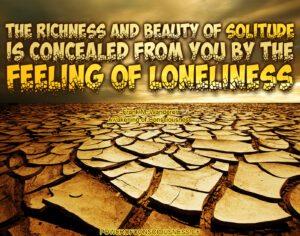Consciousness
Carl G. Jung Attitude Types and the Sash of Solitude

Jung believed that our orientation to the world was a foundational aspect of our personality. Jung identified was the two opposite ways in which we adapt to, or orient ourselves to, the world. These are Jung’s attitudes of Extraversion and Introversion. Extraversion – Our energy moves toward the outer world of people, places and things; the world outside of us. Introversion – Our energy moves toward the inner world of thoughts and ideas; the world inside of us.
Loneliness vs. Solitude
As human beings, we are social creatures and, without others around us from birth, we would not even be able to stay alive in this world. Social space plays a crucial role in the development of our personality, as the direction of our development is determined by the expectations of other people and our desire to meet those expectations. That is how we become a part of a collective, social space called society, and society receives its special nature from the culture it represents.
The book of our personal history is written in this social space, and our identity is built upon the foundation of our personal history. We are surrounded by other people, and their expectations and requirements are present in our mind when we are alone. Most people do not understand the difference between solitude and being lonely. The solitude is at the same time loneliness for us.
The two words, however, mean two different situations. Solitude is the state of the mind, whereas solitude is the state of the Consciousness.
In the isolated state of consciousness of Ego-dominated mind we do not like to be alone, when we are alone, we think we are lonely, we find it difficult to tolerate, we try to avoid it. How we do it, depends on our attitude types.

Extraversion vs. Introversion
Extroverted people focus primarily on social life. When we are alone, we seek friends, go to parties, because we like to share our pleasures and sorrows with others.
Introverted people, on the other hand, tolerate loneliness much better, they like to be alone. They turn towards their internal world (thoughts and emotions). They are not alone, though, as other people are present in their mind in the form of their opinions and expectations. When they turn inward, they talk, argue with the opinions of others, and analyze the reactions of others.
For an external observer, an introverted person might seem to be alone, but there is usually a whole little group in the head of the person. When an introverted person is alone, they try to find some activity to occupy themselves in order to avoid the unpleasant feelings that come with loneliness. They are capable of watching TV for hours, or use work as an escape route.
The Gift of Solitude

Why do people so desperately run away from loneliness, from being alone?
Because we do not know ourselves, so we do not like being alone. When we are lonely, we must face the fact that our entire personality is pretence, and our whole identity is built upon false foundations.
Even if these sentences are not formulated so specifically in our mind when we are on our own, the anxiety and depression overcoming us signify that there is something wrong with us. We feel lonely, so we escape so as to find shelter in the company of others or in our own thoughts from the negative emotions.
We feel lonely because we are full of insistence. We insist on our personal identity, our own history, in which the main roles are always played by others. Solitude is a menace to the foundations of our identity.
It is true that during our life we are often surrounded by other people, and we live our life as members of the society, but deep inside we remain separate, isolated individuals for the whole of our life. Very deep inside we are born alone, live alone and we die alone. Being alone like that is a state we interpret as solitude.
Only the awakening of the Consciousness is capable of putting an end to that sense of solitude rooted in our original isolation. Only when we have experienced that Miracle, do we recognize that loneliness is our natural state, in which the independent, still all-penetrating Presence shines on.
From the book Frank M. Wanderer Ph.D The Revolution of Consciousness: Deconditioning the Programmed Mind
Read more articles from Frank M. Wanderer
Typos, corrections and/or news tips? Email us at Contact@TheMindUnleashed.com
